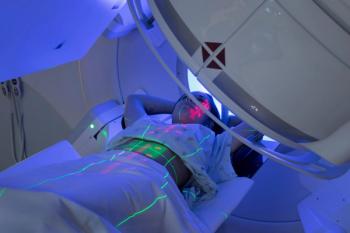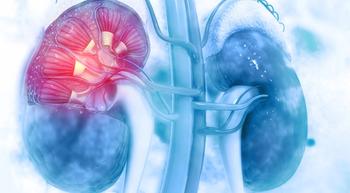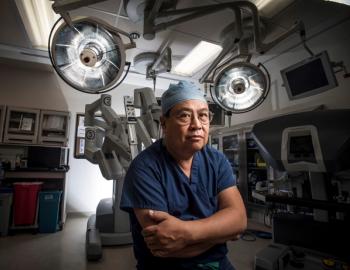
Post-transplant cyclophosphamide decreased the risk of complications in patients with blood cancers who underwent a stem cell transplant from an unrelated donor.

Brielle Benyon, Assistant Managing Editor for CURE®, has been with MJH Life Sciences since 2016. She has served as an editor on both CURE and its sister publication, Oncology Nursing News. Brielle is a graduate from The College of New Jersey. Outside of work, she enjoys spending time with family and friends, CrossFit and wishing she had the grace and confidence of her toddler-aged daughter.
Follow Brielle on Twitter @Brielle_Benyon.

Post-transplant cyclophosphamide decreased the risk of complications in patients with blood cancers who underwent a stem cell transplant from an unrelated donor.

Patients with advanced gynecologic cancer given IMNN-001 with presurgical chemotherapy tended to live nearly a year longer.

Certain genetic mutations were associated with better responses to presurgical chemotherapy in muscle-invasive bladder cancer.

Patients with head and neck squamous cell carcinoma can talk to their care team about a trial evaluating petosemtamab for recurrent or metastatic disease.

From finding reputable info to asking, “Do I really need all these drugs?” experts weighed in on important questions to ask after a myeloma diagnosis.

From democratic Rep. Sheila Jackson Lee’s death from pancreatic cancer to the rock band, Widespread Panic, canceling shows due to their guitarist’s diagnosis, here’s what’s happening in the oncology space this week.

Sequencing the novel drug, THIO, with Libtayo tended to be tolerable in patients with non-small cell lung cancer, recent research showed.

We asked oncology experts what questions patients should ask their doctors soon after receiving a cancer diagnosis. This is their advice.

Eighty percent of patients with relapsed or refractory Waldenstrom’s macroglobulinemia responded to treatment with iopofosine I 131, researchers found.

Stereotactic ablative radiotherapy led to promising disease control in patients with metastatic gynecologic cancers, research showed.

From Teddi Mellencamp revealing that she had more melanoma spots removed to Isabella Strahan announcing being cancer-free, here’s what’s happening in the oncology space this week.

Hormone therapy for breast cancer had a protective factor against Alzheimer’s disease and dementia in certain breast cancer survivors.

Relapse outcomes were similar in patients with high-risk renal cell carcinoma treated with Opdivo and with observation before and after surgery.

Patients can seek a licensed acupuncturist who may be able to help with hot flashes and other endocrine-related side effects, an expert said.

A computer model may help predict which patients with breast cancer are more likely to experience neuropathy from taxane therapies.

From a TODAY contributor opening up about breast reconstruction surgery to Arizona rep. Raúl Grijalva completing cancer treatment, here’s what’s going on in the oncology space this week.

Dana Frost, a cancer survivor and grief advocate, said writing about survivors’ guilt and connecting with others feeling the same way was therapeutic.

The Food and Drug Administration granted a fast track designation to ADI-270, an off-the-shelf CAR-T cell therapy for clear cell renal cell carcinoma.

Oncology drug shortages may slow down the discovery of new cancer treatments, an expert from the NCCN explained.

From the lead singer of Heart’s cancer diagnosis and postponing their tour to Dick Vitale’s upcoming cancer surgery, here’s what’s going on in the cancer space this week.

More frequent immunoglobulin G testing was associated with a decreased risk of severe infections in patients with CLL and non-Hodgkin lymphoma.

Patients with early-stage gastric cancer may consider stomach-preserving surgery, as it led to better quality-of-life and nutritional outcomes in a study.

Although there are still cancer drugs in short supply, the chief medical officer at the NCCN explained that most patients will not get suboptimal care.

At the CURE® Educated Patient® Breast Cancer Summit, an expert discussed integrative methods that can improve quality of life.

From Judge Frank Caprio opening up about his diagnosis of pancreatic cancer and treatment to an “Ink Master” star dying from testicular cancer, here’s what’s going on in the oncology space this week.

The Food and Drug Administration approved Tepylute — a liquid form of thiotepa — for the treatment of patients with breast or ovarian cancer.

Patients can discuss minimally invasive robotic liver cancer surgery with their care teams. The process tends to be safe and effective, an expert said.

Patients with HR-positive metastatic breast cancer can expect to undergo biomarker testing both at diagnosis and again if the disease progresses.

An expert discusses the recent approval for Retevmo for RET-positive pediatric thyroid cancer and ongoing research for this patient population.

Dato-DXd did not improve survival in the overall population with non-small cell lung cancer but did boost outcomes in patients with non-squamous disease.